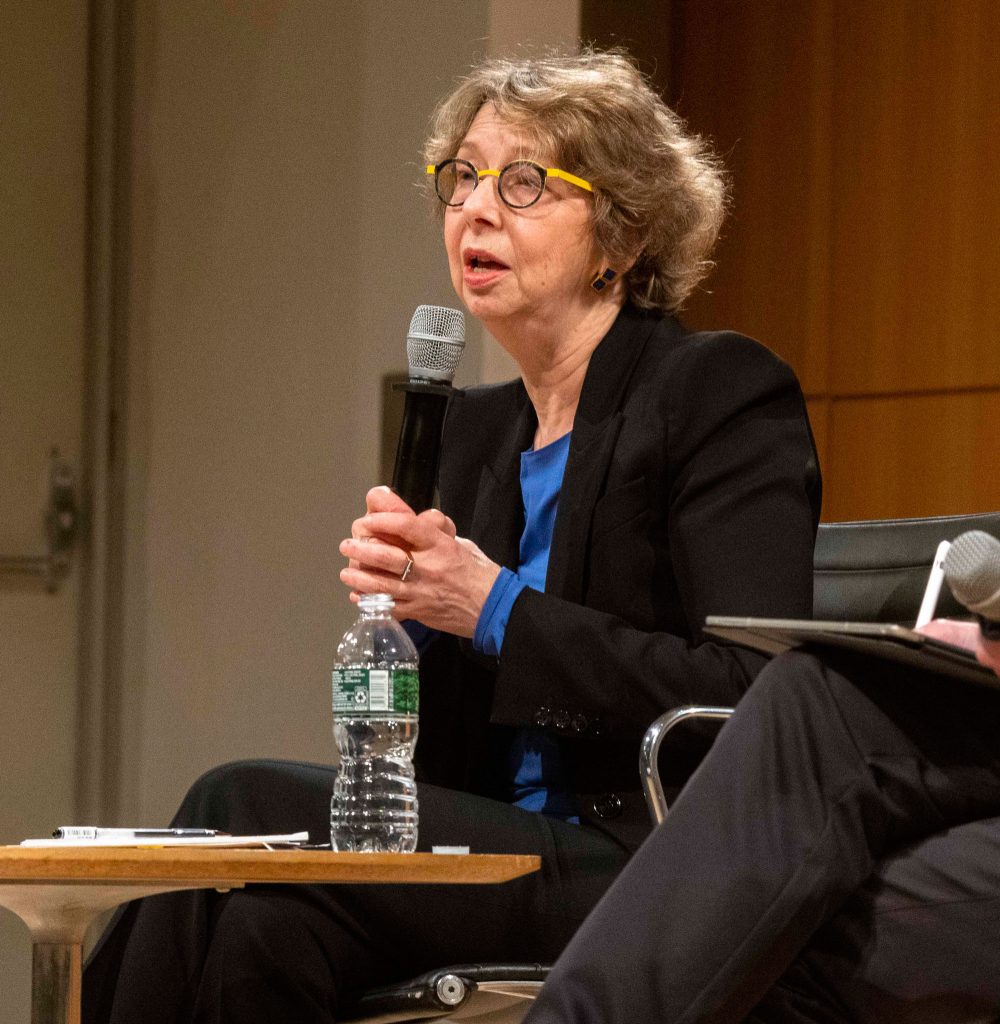
Robin Garrell addresses faculty, staff and students earlier this year. (Credit: Dave Sanders)
Robin Garrell has resigned as the Graduate Center president less than a year after faculty, staff and students issued a statement of “no confidence” in her administration.
As Clarion reported in January, a lengthy sign-on letter accused President Garrell and other “top administrators of blocking hires that would have added diversity to the faculty, fumbling fundraising efforts, shirking their governance duties, creating a general climate of low morale and understaffing key offices resulting in increased workloads for current faculty and staff.”
INTERIM LEADER
CUNY Central has announced that Joshua Brumberg, the school’s dean of science, has been appointed interim president. While it is not clear that the no-confidence statement is the direct reason for Garrell’s departure, GC activists believe that the no-confidence campaign has raised awareness about problems at the school.
“Robin Garrell’s resignation comes after months of public dissent and outrage around the administration’s dysfunction, its disrespectful attitude toward faculty and staff, and its refusal to comprehensively address the material precarity that many graduate students face,” said Zoe Hu, the PSC chapter chair for the GC. “Our next president must do better. So that we do not repeat the mistakes of the past, students, faculty and staff must have a primary decision-making role in the search for Garrell’s replacement. The process must be transparent, as befits a public institution like CUNY – this means no non-disclosure agreements. We need a president who will be attentive to issues around racial, class, gender and disability justice. We need someone who is deeply familiar with and appreciative of the GC’s legacy, who is an academic and not an austerity-minded businessperson.”
LOW PAY
Hu added, “Many GC students make less than $30,000 a year. It is impossible to maintain an intellectual community when the very members of that community are skipping meals, adjuncting multiple classes, scrambling to avoid evictions or getting stuck at grocery stores because their credit cards have been declined. We need leadership that will recognize and honor this.”
Michelle Fine, a distinguished professor of psychology, urban education and women’s studies at the Graduate Center who was instrumental in organizing the no-confidence statement, told Clarion in an email that Garrell’s departure is an opportunity to put the campus back on track with its original mission.
COLLECTIVE VISION
She said, “After a year of joyous and heartbreaking votes of no confidence and campus dissension, now the desires of the people of the GC – faculty, staff and students – must be mobilized to shape our strategic vision and help select the next president of the Graduate Center: someone who aligns with the GC’s history, ethics, values, and commitments to racial, gender, class, and disability justice and public-facing scholarship. Someone who will champion our collective vision for financially viable fellowships, insurance for all, admissions for undocumented, DACA and asylum-seeking applicants, food in the commons, respect for staff and deep participation by faculty, staff and students.”
The timing was more important than ever, Fine said. “In the midst of national, well-funded campaigns for book banning, censorship, whitewashing of curriculum, austerity and a slashing of liberal arts,” she said, “this is a moment for us to reinvent public doctoral education, CUNY-style.”
For Zee Dempster, assistant director at the GC’s Institute for Research on the African Diaspora in the Americas and the Caribbean, the last straw under Garrell was the axing of critical professional staff. “I do lament that many honorable PSC members who worked in our Business Office lost their jobs or were removed from their positions, where another vision could have seen how vital it was to keep these people in place,” she said. “Their displacement hinders the effectiveness of the entire building and was a prime catalyst for the no-confidence vote.”
A NEW SEARCH
Dempster believes the campus has a responsibility to find a new president who will advocate for the institution during difficult times.
“The question that I as a PSC member want answered is, ‘As president, what are your plans to campaign for a fully funded CUNY?’” she said. “This must be on the mind of the search committee. The Graduate Center is facing uncertainty, as does any organization headed by interim leadership. In the next year, a president must be found who envisions the GC as an educational capstone that is essential to the intellectual life of CUNY, New York City and beyond.”
Published: September 27, 2023

